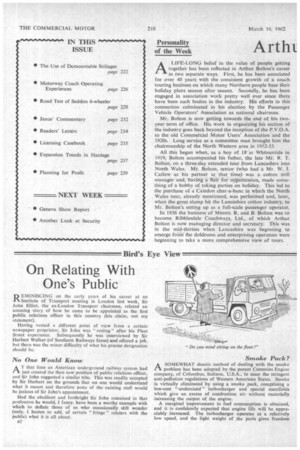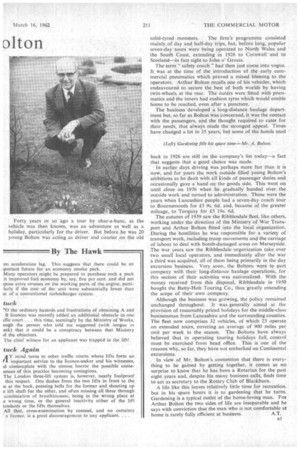Artht piton
Page 36

Page 37

If you've noticed an error in this article please click here to report it so we can fix it.
ALIFE-LONG belief in the value of people getting together has been reflected in Arthur Bolton's career in two separate ways. First, he has been associated for over 40 years with the consistent growth of a coach touring business on which many Northern people base their holiday plans season after season. Secondly, he has been engaged in association work pretty well ever since there have been such bodies in the industry. His efforts in this connection culminated in his election by the Passenger Vehicle Operators' Association as national chairman.
Mr. Bolton is now getting towards the end of his twoyear term of office. His work in organizing his section of the industry goes back beyond the inception of the P.V.O.A. to the old Commercial Motor Users' Association and the 1920s. Long service as a committee man brought him the chairmanship of the North Western area in 1952-53.
All this began' when, as a boy of 18/at Whitsuntide in 1919, Bolton accompanied his father, the late Mr. R. T. Bolton, on .a three-day extended tour from Lancashire into North Wales. Mk. Bolton, senior (who had a Mr. W. I. Callow as his partner at that time) was a cotton mill manager and, having a flair for organization, made something of a hobby of taking parties on holiday. This led to the purchase of a Caledon char-a-banc in which the North Wales tour, already mentioned, was performed and, later, when the great slump hit the Lancashire cotton industry, to Mr. Bolton's setting up as a full-scale passenger operator.
In 1936 the business of Messrs. R. and B. Bolton 'was to become Ribblesdale Coachways, Ltd., of which Arthur Bolton is now managing director and secretary. This was in the mid-thirties when Lancashire was .beginning to emerge from the doldrums and enterprising operators were beginning to take a more comprehensive view of tours.
Forty years or so -ago a tour by• char-a-banc, as the vehicle was then known, was an adventure as well as a holiday, particularly for the driver. But before he was 20 young Bolton was acting as driver and courier on the old
solid-tyred monsters. The firm's programme consisted mainly, of day and half-day trips, but, before long, popular seven-day tours were being operated to North Wales and the South Coast, extending in 1926 to Cornwall and to Scotland—in fact right to John o' Groats.
The term "safety coach" had then just come into vogue. It was at the time of the introduction of the early commercial pneumatics which proved a mixed blessing to the operators. Arthur Bolton recalls one of his vehicles, which endeavoured to secure the best of both worlds by having twin-wheels at the rear. The outers were fitted with pneumatics and the inners had cushion tyres which would enable home to be reached, even after a puncture.
The business developed a long-distance haulage department but, so far as Bolton was concerned, it was the contact with the passengers, and the thought required to cater for their needs, that always made the strongest appeal. Times have changed a lot in 35 years, but some of the hotels used
back in 1926 are still on the company's list today—a fact that suggests that a good choice was made.
In earlier days driving was perhaps more fun than it is now, and for years the work outside filled young Bolton's ambitions as he dealt with all kinds of passenger duties and occasionally gave a hand on the goods side. This went on until close on 1936 when he gradually handed o'ver, the outside work and turned to administration. Those were the years when Lancashire people had a seven-day coach tour to Bournemouth for £5 9s. 6d. and, because of the greater mileage, to Torquay for £5 19s. 6d.
The autumn of 1939 saw the Ribblesdale fleet, like others, working under the direction of the Ministry of War Transport and Arthur Bolton fitted into the local organization. During the hostilities he was responsible for a variety of transport work, including troop movements and the carriage of labour to deal with bomb-damaged areas on Merseyside. The war years saw the Ribblesdale organization take over two small local operators, and immediately after the war a third was acquired, all of them being primarily in the day excursion business. Very soon, the Boltons were to part company with their long-distance haulage operations, for this section of their activities was nationalized. With the money received from this disposal, Ribblesdale in 1950 bought the Batty-Holt Touring Co., thus greatly extending the scope of their own company.
Although the business was growing, the policy remained unchanged throughout. It was generally aimed at the provision of reasonably priced holidays for the middle-class . businessman from Lancashire and the surrounding counties. The fleet now comprises 32 vehicles, of which 23 operate on extended tours, covering an average of 900 miles per unit per week in the season. The Boltons have always believed that in operating touring holidays full, control, must be exercised from head office. This is one of the reasons why, so far, they have not embarked on Continental excursions.
In view of Mr. Bolton's contention that there is everything to be gained by getting together, it comes as no surprise to know that he has been a Rotarian for the past eight years and, despite his many business calls, finds time to act as secretary to the Rotary Club of Blackburn.
A life like this leaves relatively little time for recreation, but in his spare hours it is to gardening that he turns. Gardening is a typical outlet of the home-loving man. For Arthur Bolton the two sides of life are inseparable and he says with conviction that the man who is not comfortable at
home is rarely fully efficient at business. A.T.




















































































































